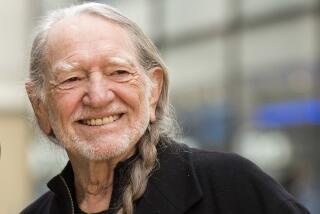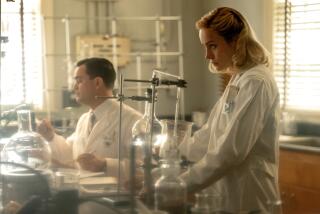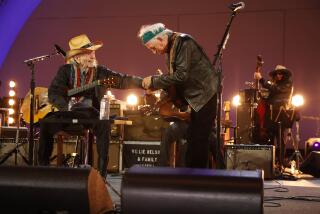TV’s Harriet Nelson Dies at Laguna Home : First person: Family came first. Deaths of husband Ozzie and son Rick were overwhelming.
- Share via
It was unnerving talking to Harriet Nelson about something so private as her overwhelming grief after Ozzie died.
You just don’t expect it from someone you grew up watching on television, especially the cheery woman who personified American motherhood to a generation.
But here we sat on the patio of her home overlooking the beach in South Laguna in 1981, her eyes welling up, as she talked publicly for the first time about the impact of Ozzie’s death of cancer six years earlier.
“We were almost like one person, and I don’t know that it should be that way,” she said.
Even then she had not gotten over losing her husband of nearly 40 years and Harriet, who died Sunday at age 85, never really would.
For 14 seasons, between 1952 and 1966, the TV Nelsons lived a seemingly idyllic life in which their problems generally were no more serious than a simple misunderstanding.
As latter-day critics are wont to complain, the white picket fence world of ‘50s sitcoms bore no resemblance to real life, especially the interminably happy Nelson home. They’re right, of course. Not even the real Nelson family was so blessed.
But as Harriet often said, “The Adventures of Ozzie and Harriet” was intended as entertainment, not a documentary on American family life.
“I get upset at the lack of understanding when the critics relate the show to today’s families,” she told me during a later talk. “They are annoyed that we didn’t deal yesterday with today’s problems. I think it’s silly.”
That critics would seemingly take particular delight in attacking “Ozzie and Harriet” makes sense. After all, how many real-life families played “themselves” on TV each week?
That television-bred familiarity made Harriet Nelson one of the most recognizable mother figures in TV history, a fact that she good-naturedly acknowledged well into her 80s by joking, “Nobody recognizes me without an apron and a coffeepot in my hand.”
The truth was that during the making of the TV series, Harriet Nelson put in a full day at the studio, and when she and Ozzie returned home from work, dinner already had been prepared by their longtime housekeeper.
There was, as I would discover, much more to Harriet Nelson than the stereotypical TV image.
The daughter of theatrical parents who played the Midwest stock company circuit, she had her first speaking role on stage at age 3. She was dancing and singing in a popular Manhattan nightclub in 1932 when bandleader Ozzie Nelson hired her to be his vocalist.
Harriet made her movie debut in “Follow the Fleet” with Fred Astaire and Ginger Rogers in 1936 and played straight woman to comedian Red Skelton on his radio program in the early ‘40s--before the radio debut of “The Adventures of Ozzie and Harriet” in 1944.
I’d learn all that--and more--during long interview sessions with her in the late ‘80s. That was after she authorized me to write a TV nostalgia book on the Nelsons’ heyday as “America’s favorite family.”
I wrote a letter to her proposing the book on the morning of Dec. 31, 1985. That night, I, along with millions of other Americans, was stunned to hear on the 6 o’clock news that Rick Nelson had been killed in a plane crash.
Fortunately, I hadn’t mailed the letter that day and I held off mailing it for another 10 months; it just didn’t seem right so soon after Harriet’s latest loss. After I mailed it, Harriet called and said she had turned down many book offers over the years. Knowing the tell-all nature of contemporary book publishing, she had no interest in participating in a biography.
“I know what they want, and I won’t do it,” she said.
But she had no problem with a book that would deal with the family’s TV show years, a time when her “boys” were still young, a time before divorces and tabloid innuendoes.
Most of all, though, she wanted to do the book for Ozzie’s sake--to give him the recognition she felt he justly deserved for his role as a television pioneer. Unlike his TV character, who seemingly had no job whatsoever, Ozzie produced and directed “The Adventures of Ozzie and Harriet,” overseeing every aspect of the show from casting to writing to the music.
And so began a working relationship that blossomed into a friendship.
I spent many afternoons sitting with her on the white sofa in her living room, a tape recorder on the coffee table catching her reminiscences. Then we discovered it was more comfortable at the dining room table.
She’d always have coffee ready when I arrived and would ask if I had eaten lunch. I always declined her offer of food, but one time I accepted. And if I was expecting something homemade from the kitchen of one of America’s most famous housewives, she surprised me with sandwiches she had bought from her favorite deli down Coast Highway.
The interviews were interspersed with occasional phone calls. The calls were always cheerful, as she’d fill me in on the doings of David or her grandchildren. Once, she had gone to Disneyland with granddaughter Tracy Nelson and a group of Tracy’s young girlfriends and laughingly boasted that “we closed the place down.”
But she sounded terribly upset another time I called her. Just hours earlier a grease fire on her stove had caused extensive damage to her kitchen.
“I’ve been having a rough day,” she confessed. I had never heard her so down. After hanging up, I impulsively called a Laguna florist and ordered a bouquet of spring flowers delivered to her. (After nearly 20 years of marriage, I knew the healing effect of flowers.)
A couple of hours later, the phone rang. It was Harriet, sounding her usually upbeat and cheerful self as she thanked me for the flowers. “You made my day,” she said, then joked: “You tell your mother I’m going to adopt you.”
Coming from Harriet Nelson, it somehow seemed the ultimate benediction.
Our “Ozzie and Harriet” TV show book, alas, never sold. And not for a lack of trying.
Although it generated interest among several publishers, the overriding response was that the show’s time had passed and it had not achieved cult status, a la “Gilligan’s Island” or “Mr. Ed.” Said one young editor: “Now, if it were about ‘The Brady Bunch’. . .”
When it was clear the book wouldn’t sell, our phone chats became less frequent.
Battling emphysema over the past two years, Harriet was unable to come to the phone the couple of times I called. I missed our talks and found it hard to picture her less than vital. Harriet Nelson succumbing to old age? It just didn’t seem possible.
But there’s a more upbeat image I like to conjure up when I think of Harriet.
As I was leaving after one of my last visits, the phone rang. It was her son, David. Walking toward the door, I heard her throaty chuckle.
And that’s how I’d like to remember her: Old age, illness, demons and tragedies at bay. Like a family sitcom from the ‘50s. Forever upbeat. Forever cheery. Forever Harriet Nelson.
More to Read
The complete guide to home viewing
Get Screen Gab for everything about the TV shows and streaming movies everyone’s talking about.
You may occasionally receive promotional content from the Los Angeles Times.






